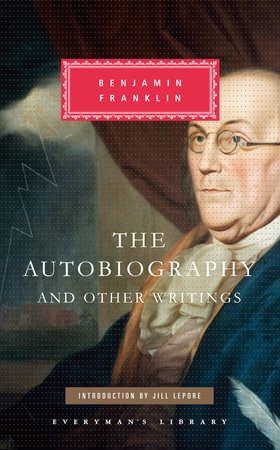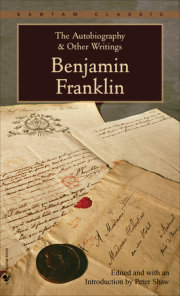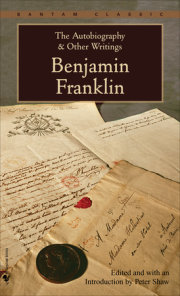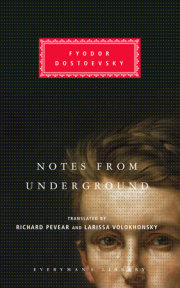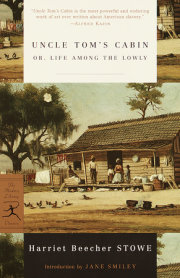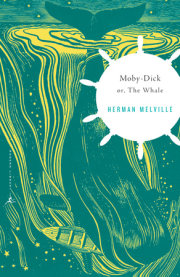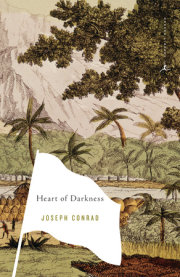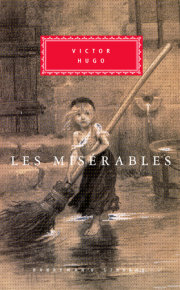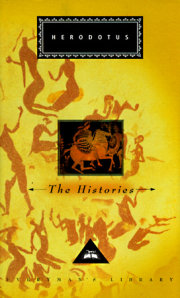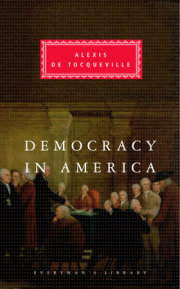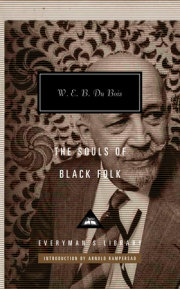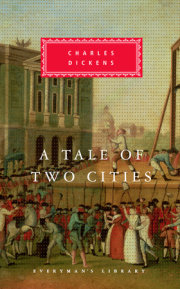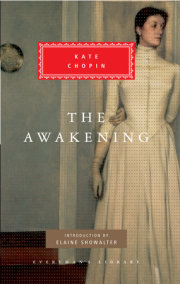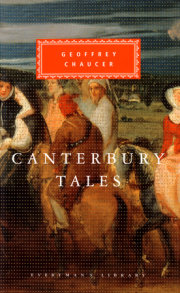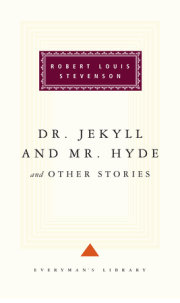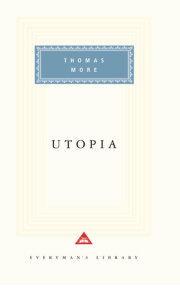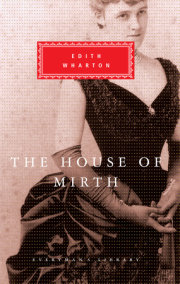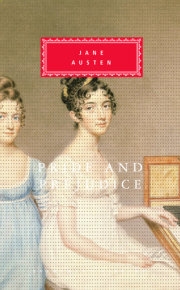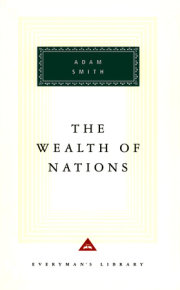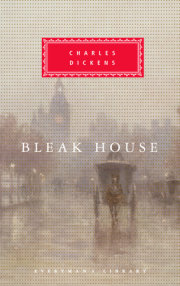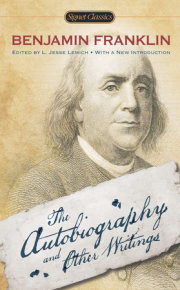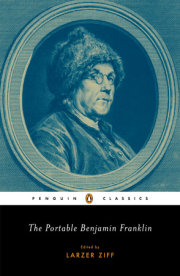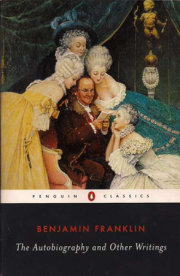Excerpt from the Introduction by Jill Lepore
I N T R O D U C T I O N
Or, from the Printer to the Reader‘‘I could as easily make a Collection for you of all the past Parings of my Nails,’’ Benjamin Franklin wrote to his sister Jane in 1767, after she asked him to send her all his old essays on politics. It was as if, in dashing off articles, he’d been sloughing off pages, like a snake shedding skin.[1] Franklin liked to think of himself as a book: a man of letters, spine of bone, flesh of paper, blood of ink, his skin a cover of leather, stitched. When he wrote, he molted.He could be as sneaky as a snake, too, something to bear in mind when reading his autobiography, as sly an account as anything Franklin ever allowed himself the grave indiscretion of putting on paper.
Franklin was awriter, a scientist, and a statesman but, first and last, he was a printer. He knew every form and each style, every font and each type. In his shop, he sold quills and inkstands, foolscap and folios, almanacs and spelling books. He bought rags for making paper. ‘‘READY MONEY for old RAGS, may be had of the Printer thereof,’’ he announced in the pages of his newspaper, the
Pennsylvania Gazette.[2] He owned papermills and printing presses. He printed newspapers and novels, magazines and treatises. He sold, in his shop, an entire inventory of blank forms: ‘‘Bills of Lading bound and unbound, Common Blank Bonds for Money, Bonds with Judgment, Counterbonds, Arbitration Bonds, Arbitration Bonds with Umpirage, Bail Bonds, Counterbonds to save Bail harmless, Bills of Sale, Powers of Attorney, Writs, Summons, Apprentices Indentures, Servants Indentures, Penal Bills, Promissory Notes, &c. all the Blanks in the most authentick Forms, and correctly printed.’’[3]He was a jack-of-allpages:
authentick, and correctly printed.
Aprinter ofmoney, a trader in the authentic, amaster of every form, Benjamin Franklin had a genius for counterfeit. Long after he stopped buying rags, soaking them, pressing theminto pages, gracing them with ink, and selling them as books – turning rags into riches – he signed himself ‘‘B. Franklin, printer.’’ But what he liked bestwas not signing his name. He loved satire, imposture, and anonymity. He once wrote a parody of a gentleman’s conduct manual in the form of a letter advising a young man suffering from ‘‘violent natural Inclinations’’ – ‘‘that hard-to-be govern’d Passion of Youth’’ – but unwilling to get married to remedy what ailed him, to take only older women for mistresses. ‘‘Their Conversation is more improving,’’ he remarked; they’re ‘‘more prudent and discreet,’’ and they’re better at other things, too, ‘‘every Knack being by Practice capable of Improvement,’’ not to mention, ‘‘There is no hazard of Children.’’ Then, too, ‘‘in the dark all Cats are grey’’ and, after all, ‘‘They are
so grateful !!’’[4] Not counting his mistresses, he rarely placed his faith in the discretion of others. ‘‘Three can keep a secret if two of them are dead,’’ went one of themany proverbs Franklin signed using the name of Richard Saunders, a fictional character he’d created, a daft astrologer who was the alleged author of Poor
Richard’s Almanack.[5] (Poor Richard was Franklin’s affectionate homage to Jonathan Swift’s imaginary almanac-maker, Isaac Bickerstaff, Esq.) Most of his best fakes he never printed; instead, he read them – performed them – for friends. (‘‘Strange! that a Man who has wit enough to write a Satyr; should have folly enough to publish it,’’ Poor Richard says.) He faked court documents, elegies, and even Scripture. He was an exceptionally skilled mimic: he taught himself to write by reading Swift, and by copying the style of the essayists in an English gentlemen’s magazine, The Spectator. He once wrote a chapter of the Old Testament in pitch-perfect King James that he bound within the pages of his own Bible so that he could read it aloud to see who would fall for it. (He’d never have published it because, as Poor Richard says, ‘‘Talking against Religion is unchaining a Tyger.’’) In Franklin’s fake Genesis chapter 39, Abraham is sitting in the door of his tent at sundown when ‘‘behold a Man, bowed with Age, came from the Way of the Wilderness, leaning on a Staff.’’ Abraham invites the stranger into the tent but when the old man reveals himself an infidel, Abraham, self-righteous, kicks him out. The next morning, God, finding the old man gone, is peevish and exasperated: ‘‘Have I borne with him these hundred ninety and eight Years, and nourished him, and cloathed him, notwithstanding his Rebellion against me, and couldst not thou, that art thyself a Sinner, bear with himone
Night?’’
Swift first published nearly everything he ever wrote either anonymously, or using a pen name; so did Franklin. ‘‘When the Writer conceals himself, he has the Advantage of hearing the Censure both of Friends and Enemies, express’d with more Impartiality,’’ Franklin explained.[6] It was also more fun that way: he wished to delight himself. Some of Franklin’s satires are so cunning they weren’t discovered to be hoaxes, or his, until long after he was dead, and some, once discovered, were buried, or even destroyed. The first scholar to collect Franklin’s papers, the Harvard historian and former chaplain of Congress, Jared Sparks, who published a ten-volume edition of Franklin’s
Works in the 1830s, was a humorless pedant who suppressed anything he found in Franklin that offended his sensibilities, silently cutting out of Franklin’s letters, for instance, all of his filthy jokes. Needless to say, Sparks included in his edition of Franklin’s
Works neither Franklin’s advice about taking old women as mistresses nor his parable against religious persecution. ‘‘If you wou’d not be forgotten/As soon as you are dead and rotten,’’ Poor Richard says, ‘‘Either write things worth the reading,/Or do things worth the writing.’’ He might have added: And leave your papers in the hands of a better editor.
‘‘He was a hard lot,’’ Mark Twain once wrote about Franklin, but all Twain or anyone else knew, for a century, was Sparks’s Franklin, which was hardly Franklin at all.[7] In 1938, when Carl Van Doren published a biography of Benjamin Franklin, on the heels of a biography of Jonathan Swift, he explained that he felt he had no choice. It was as if Sparks had locked Franklin in a box. ‘‘The dry, prim people seem to regard him as a treasure shut up in a savings bank, to which they have the lawful key,’’ Van Doren wrote. ‘‘I herewith give him back, in grand dimensions, to his nation and the world.’’[8] But it was, by then, nearly too late: Franklin is still locked in that bank vault, his face on the hundred-dollar bill, his best-known essay ‘‘The Way to Wealth,’’ as if what he stood for was making money. Nothing could be less true. What Franklin stood for was making knowledge.
Much of what Sparks kept out of Franklin’s
Works he set aside because it offended him, but a lot of it he never found. After Franklin’s death, his papers, including drafts of the story of his life, had been scattered. Sheaves of his papers wound up in a tailor’s shop on St. James’s Street in London, cut into sleeve patterns. Then there was the matter of disguise; it was impossible, when Sparks was writing, and it remains difficult, even today, to find everything that Franklin ever wrote. By the latest count, which is doubtless incomplete, Franklin used more than a hundred pen names. ‘‘Silence Dogood’’ was the first – he used it when hewas sixteen – and the funniest; ‘‘Historicus,’’ the name under which he published an anti-slavery essay hewrote from his deathbed, the last, and the most serious. In between, he signed himself everything from the slipslop ‘‘Homespun’’ and the indelicate ‘‘FART-HING’’ to the imperious ‘‘Benevolus’’ and the pretentious ‘‘Americanus.’’ Once, as ‘‘The Busy-Body,’’ he expressed his opinion that a writer ought to be judged by his words alone – the man, his book – and that signing one’s own name to one’s essays was nothing more than an act of vanity: ‘‘Every Man will own, that an Author, as such, ought to be try’d by the Merit of his Productions only.’’[9] But, honestly, few writers were vainer. ‘‘Most People dislike
Vanity in others whatever Share they have of it themselves,’’ he admitted, ‘‘but I give it fair Quarter wherever I meet with it.’’
Franklin’s love of anonymity and disguisemake it strange that he’s best known for writing the only kind of book an author can’t publish under a fake name: an autobiography. (An aside about the title. Franklin never called it an ‘‘autobiography’’: that word wasn’t coined until, seven years after his death, it appeared in an English literary magazine, where it was meant as a joke – was there ever a sillier word?[10] It was Sparks who first called what Franklin had written an autobiography, in all seriousness, when he included it in the first volume of his
Works.) In fact, Franklin’s style is actually a very poor fit for the form, which may be why it took him nearly twenty years to write what little he did of the story of his life, why he never finished it, and why he never allowed any part of it to be printed.
Another reason the very existence of Franklin’s autobiography is surprising is that he was forever advising other people not to talk about themselves so much, because nattering on about your own life is so dreadfully tiresome: ‘‘What is it to the Company we fall into whether we quarrel with our Servants, whether our Children are froward and dirty, or what we intend to have for Dinner to morrow?’’ he asked, in ‘‘On Conversation,’’ an essay he published in the
Pennsylvania Gazette in 1730.[11] ‘‘Talkmuch of your-self, your Education, your Knowledge, your Circumstances, your Successes in Business, your Victories in Disputes, your ownwise Sayings and Observations on particular Occasions, &c. &c. &c.,’’ Franklin wrote in 1750, in ‘‘Rules for Making Oneself a Disagreeable Companion,’’[12] which is nothing if not an excellent set of instructions for writers of autobiographies.
1 BF to Jane Franklin Mecom, London, December 24, 1767.
2 Advertisement,
Pennsylvania Gazette, April 18, 1734.
3 Advertisement,
Pennsylvania Gazette, October 9, 1729.
4
Advice to a Young Man on the Choice of a Mistress, 1745.
5 BF,
Poor Richard’s Almanack, 1732–57.
6 BF, ‘‘On Literary Style,’’ printed in
The Pennsylvania Gazette, August 2, 1733.
7 Mark Twain, ‘‘The Late Benjamin Franklin,’’
The Galaxy, July 1870, pp. 138–40.
8 Carl Van Doren,
Benjamin Franklin (1938), viii–ix.
9 BF, ‘‘The Busy-Body,’’ No. 8, printed in The AmericanWeekly Mercury, March 27, 1729. And see ‘‘The Printer to the Reader,’’ printed in
The New-England Courant, February 11, 1723:
[On anonymity] ‘‘As for the Author, that is the next Question. But tho’ we profess our selves ready to oblige the ingenious and courteous Reader with most Sorts of Intelligence, yet here we beg a Reserve. Nor will it be anyManner of Advantage either to them or to the Writers, that their Names should be published; and therefore in this Matter we desire the Favour of you to suffer us to hold our Tongues: Which tho’ at this Time of Day it may sound like a very uncommon Request, yet it proceeds from the very Hearts of your Humble Servants.’’
10 ‘‘Self-biography,’’ a writer for London’s Monthly Review mused in 1797, was probably not a legitimate word: ‘‘it is not very usual in English to employ hybrid words partly Saxon and partly Greek: yet autobiography would have seemed pedantic.’’ OED: W. Taylor in Monthly Rev. 2nd Ser. 24 375.
11 BF, ‘‘OnConversation,’’ printed in
The Pennsylvania Gazette, October 15, 1730.
12 BF, ‘‘Rules forMaking Oneself a Disagreeable Companion,’’ printed in
The Pennsylvania Gazette, November 15, 1750.
Copyright © 1982 by Benjamin Franklin. All rights reserved. No part of this excerpt may be reproduced or reprinted without permission in writing from the publisher.

